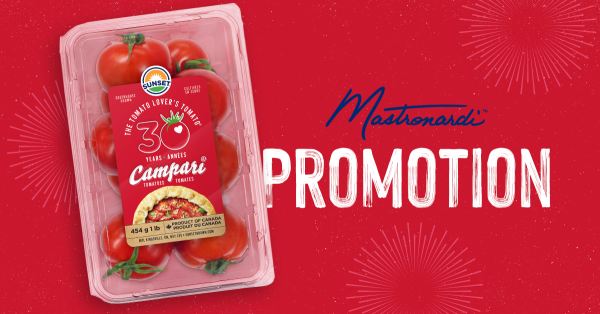
Michael Castagnetto, President, Robinson Fresh Talks Sustainability Through the Supply Chain Ahead of the Organic Produce Summit
EDEN PRAIRIE, MN - The supply chain is like a puzzle, evermore complicated and with an endless queue of pieces in a constant state of flux competing against the whole. Challenging? Of course. Is the Organic Produce Summit (OPS) eager, ready, and waiting to address its complexity? The answer to that question is a resounding: YES. As we quickly approach the July 13–14 event in Monterey, California, I looked to the coveted educational sessions—a hallmark of the event—to find where such conversations may be cultivated. One of those opportunities that rose to the top of my list was “Sustainability Through the Supply Chain: What’s Working and What’s Not?” moderated by Michael Castagnetto, President, Robinson Fresh.
Along with panelists Daniella Velazquez de León, General Manager, Organics Unlimited; Shawn Peery, National Vice President Produce, Albertsons Companies; and Monica Wyant, Produce Business Manager, Meijer, Michael is on the hunt to open up a discussion about sustainability as deep and dynamic as the supply chain itself.
 “We have a great session planned and a remarkable group of panelists for this year’s discussion on sustainability,” Michael shares with me as he introduces the vision behind the panel. “The areas that we will focus on during this discussion will be centered around our three primary pillar areas of work at Robinson Fresh: product, packaging, and the path to purchase.”
“We have a great session planned and a remarkable group of panelists for this year’s discussion on sustainability,” Michael shares with me as he introduces the vision behind the panel. “The areas that we will focus on during this discussion will be centered around our three primary pillar areas of work at Robinson Fresh: product, packaging, and the path to purchase.”
Expanding on this focus, Michael continues by breaking down this strategy’s trifecta of elements so that we might better understand the value and the investment required by each.
- Product - At the heart of a sustainable food system are the farmers who dedicate their lives to nurturing the land to bring fresh food to our store shelves. Here we will dive into the growing process.
- Packaging - At Robinson Fresh, our goal is to develop a range of sustainable packaging solutions, including recyclable packaging options across our product portfolio. This conversation will touch on how organizations are paving the way to deliver product to customers and consumers in a more sustainable way.
- Path to Purchase - The above pillars lead to the customers and retailers’ path to purchase. How does our industry build a more sustainable path to purchase, and how can we help to execute a sustainable supply chain?

The scale of such a discussion can, at times, be itself a barrier to entering the dialogue. But, as Michael tells me, for the majority it is the presumed costs that many associate with sustainability that presents a hurdle to be overcome.
“Many assume that it typically costs more money to use recyclable materials in packaging, and we have found that customers can be hesitant to pay for that convenience. To build off this, another aspect is getting the consumer to actually recycle and compost the packaging to ensure the full benefits of sustainable packaging,” he tells me.
So, how will these challenges be answered by the 2022 OPS panel? Well, you will have to attend to find out. But, I can promise you one thing: A seat at the sustainability table is not only imperative, it’s valuable, and Michael knows why.

“The organic fresh fruit and vegetable industry is in a unique position to make the global food system healthier for both people and the planet. As we continue to move toward greater circular business models which re-use waste streams, develop efficient renewable resources, and minimize environmental and social impacts, the case for greater emphasis and measuring of sustainability efforts has never been stronger,” Michael expresses, bringing all the pieces of the puzzle into the spotlight. “Now is the time to discuss the opportunities and challenges on issues relating to water, food waste, packaging, social equality, and economic concerns across the supply chain that will impact the food system in the coming years.”
C.H. Robinson (CHR) is one of those elite companies that does not just preach necessity and solutions, it exercises them. Robinson Fresh and CHR have committed to working to reduce its carbon intensity by 40 percent by 2025—no small number when every percentage point counts.
The company’s sustainability vision is extremely important as the operation works to create more efficient supply chains. This is not only smart for business, but also reduces waste, decreases carbon emissions, and will make the world around us better for generations to come, Michael continues.

“Our corporate sustainability initiatives focus on making improvements within our company, with our customers and carriers, and on the transportation industry as a whole,” he reflects. “Furthermore, at Robinson Fresh, we believe our approach to sustainability can help our customers, growers, contract carriers, and suppliers add value to their supply chains. Our sustainability goals are achievable thanks in part to the initiatives we’ve put in place with several recognizable companies in the industry.”
For a more expanded conversation around sustainability across this segment of the industry, mark the “Sustainability Through the Supply Chain: What’s Working and What’s Not?” educational session down on your calendars and I will see you all on July 14 at 9 a.m. PST sharp.
OPS, here we come!



















